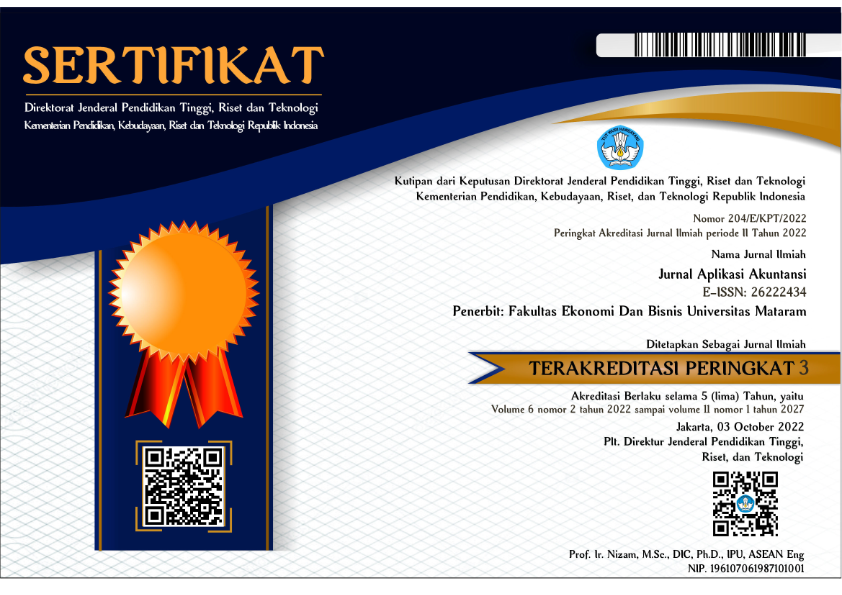THE IMPACT OF ESG PERFORMANCE TO FIRM PERFORMANCE AND MARKET VALUE
DOI:
https://doi.org/10.29303/jaa.v5i1.84Keywords:
ESG, Operational Performance, Financial Performance, Market Value, SustainabilityAbstract
This research aims to investigate the impact of ESG performance on firm performance and market value. Total samples used are 271 listed companies (1355 firm-years observations) in five years period (2013-2017), which consisted of four ASEAN countries (Indonesia, Malaysia, Singapore, and Thailand). This study is analyzed using multiple regression analyses with the random-effect model and descriptive statistic. The independent variable is ESG Score; the dependent variables are three performance indicators (Return on Assets, Return on Equity, and Tobin’s Q) and Price-Earnings ratio; the control variables are firm size, firm's age, financial leverage, and industry. This research contributes to broadening the scope of the literature review regardings ESG performance by analyzing it on developing countries and also by using rarely used dependent variables, market value. The finding in this research is there is no significant influence from ESG Score to Firm Performance and Market Value because ESG Score is not yet a part of firm performance measurement. This research is limited in conducting lag effect research with the lag period of only one year, and also the number of companies that already have ESG scores is limited.
References
Ahmed, S. U, Z. Islam, and I. Hasan. 2012. “Corporate Social Responsibility and Financial Performance: Evidence from the Financial Sector.” Journal of Organizational Management 1 (1): 14–21. https://doi.org/10.22495/cocv8i2p3.
Bai, C., Q. Liu, J. Lu, F. M. Song, and J. Zhang. 2004. “Corporate Governance and Market Valuation in China.” Journal of Comparative Economics 32 (4): 599–616. https://doi.org/10.1016/j.jce.2004.07.002.
Banerjee, A., S. Gokarn, M. Pattanayak, and S.K. Sinha. 2009. “Corporate Governance and Market Value: Preliminary Evidence from Indian Companies.” Standard & Poor.
Buallay, A. 2018. “Is Sustainability Reporting (ESG) Associated with Performance? Evidence from the European Banking Sector.” Management of Environmental Quality: An International Journal 30 (1): 98–115. https://doi.org/10.1108/MEQ-12-2017-0149.
Caesaria, A. F., and B. Basuki. 2017. “The Study of Sustainability Report Disclosure Aspects and Their Impact on the Companies’ Performance.” SHS Web of Conferences 34: 08001. https://doi.org/10.1051/shsconf/20173408001.
Daszyńska-Żygadlo, K., T. Słoński, and B. Zawadzki. 2016. “The Market Value of CSR Performance across Sectors.” Engineering Economics 27 (2): 230–38. https://doi.org/10.5755/j01.ee.27.2.13480.
Griffin, J. J., and J. F. Mahon. 1997. “The Corporate Social Performance and Corporate Financial Performance Debate: Twenty-Five Years of Incomparable Research.” Business and Society 36 (1): 5–31. https://doi.org/10.1177/000765039703600102.
Gujarati, D. N., and D. C. Porter. 2009. Basic Econometrics 5th Ed. Boston: McGraw-Hill Education.
Kao, E. H., C. Yeh, L. Wang, and H. Fung. 2018. “The Relationship between CSR and Performance: Evidence in China.” Pacific Basin Finance Journal 51: 155–70. https://doi.org/10.1016/j.pacfin.2018.04.006.
Little, P. L., and B. L. Little. 2000. “Do Perceptions of Corporate Social Responsibility Contribute to Explaining Differences in Corporate Price-Earnings Ratios? A Research Note.” Corporate Reputation Review 3 (2): 137–42. https://doi.org/10.1057/palgrave.crr.1540108.
López, M. V., A. Garcia, and L. Rodriguez. 2007. “Sustainable Development and Corporate Performance: A Study Based on the Dow Jones Sustainability Index.” Journal of Business Ethics 75 (3): 285–300. https://doi.org/10.1007/s10551-006-9253-8.
Manisa, D. E., and F. Defung. 2017. “The Influence of Disclosure of Sustainability Report on Financial Performance of Infrastructure Companies Listed on Indonesia Stock Exchange.” Jurnal Ekonomi Manajemen Dan Akuntansi 19 (2): 174–87.
Nachrowi, N. D., and H. Usman. 2006. Pendekatan Populer Dan Praktis Ekonometrika Untuk Analisis Ekonomi Dan Keuangan. Jakarta: Lembaga Penerbit Fakultas Ekonomi Universitas Indonesia.
Nilsson, M., D. Griggs, and M. Visbeck. 2016. “Policy: Map the Interactions between Sustainable Development Goals.” Nature 534 (7607): 320–22. https://doi.org/10.1038/534320a.
Ross, S. A. 1977. “The Determination of Financial Structure : The Incentive-Signalling Approach.” The Bell Journal of Economics 8 (1): 23–40.
Siew, R. Y. J. 2015. “A Review of Corporate Sustainability Reporting Tools (SRTs).” Journal of Environmental Management 164: 180–95. https://doi.org/10.1016/j.jenvman.2015.09.010.
Tarigan, J., and H. Semuel. 2014. “Pengungkapan Sustainability Report Dan Kinerja Keuangan.” Jurnal Akuntansi Dan Keuangan 16 (2): 88–101. https://doi.org/10.9744/jak.16.2.88-101.
Tarmuji, I., R. Maelah, and N. H. Tarmuji. 2016. “The Impact of Environmental, Social and Governance Practices (ESG) on Economic Performance: Evidence from ESG Score.” International Journal of Trade, Economics and Finance 7 (3): 67–74. https://doi.org/10.18178/ijtef.2016.7.3.501.
Velte, P. 2017. “Does ESG Performance Have an Impact on Financial Performance? Evidence from Germany.” Journal of Global Responsibility 8 (2): 169–78. https://doi.org/10.1108/jgr-11-2016-0029.
Wagner, M. 2010. “The Role of Corporate Sustainability Performance for Economic Performance: A Firm-Level Analysis of Moderation Effects.” Ecological Economics 69 (7): 1553–60. https://doi.org/10.1016/j.ecolecon.2010.02.017.









